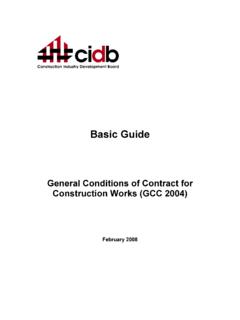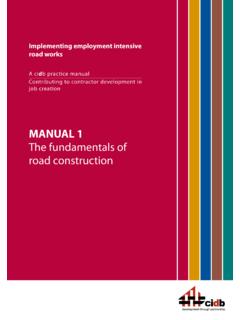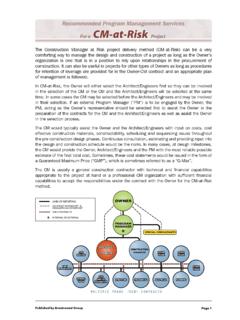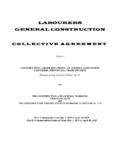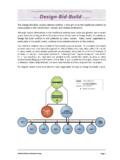Transcription of for all parties engaged in construction …
1 1 Code of Conductfor all parties engaged in construction procurement2 Code of Conduct for all parties engaged in construction Procurement in terms of the construction Industry Development Board Act (Act of 2000).The construction Industry Development Board (CIDB) is a Schedule 3A public entity, established in terms of the construction Industry Development Board Act,(2000), to provide leadership to stakeholders, to stimulate sustainable growth, reform and improvement of the construction sector for effective delivery and the industry s enhanced role in the country s economy.
2 Section 5(4) of the Act mandates the CIDB to establish and promote uniform and ethical standards that regulate the actions, practices and procedures of parties engaged in construction contracts and stipulates that the CIDB must publish a code of conduct for all construction -related procurement and all participants involved in the procurement .3 Good corporate governance is being introduced throughout the world as a business imperative offering competitive advantage. Investors and employers prefer to do business with those business enterprises that uphold the key elements of corporate governance, namely discipline, transparency, independence, accountability, responsibility, fairness and social responsibility.
3 To participants in the construction industry, good corporate governance is of particular importance and many of the employers (clients), as well as contractors, material manufacturers and suppliers are under obligation to adhere to the provisions of the King Report on Corporate Governance for South Africa, 2002. Professional service providers are also obliged, in their role as trusted advisers, to assist clients to comply with these provisions. In this context, the development of the construction industry will be promoted by participant and stakeholder organisations that: Clearly state and enact corporate values; Ensure that they perform efficiently, responsibly, accountably, transparently, and with probity; Recognise the legitimacy of interest of defined stakeholders; Engage in long-term relationships; Adopt agreed codes to tackle corruption and persist in the enforcement thereof; Give due recognition to the respect for human rights.
4 Respect the well-being of employees, treating them fairly and with cultural sensitivity; Practice and encourage greater environmental and social responsibility; Avoid the use of harmful products and processes; Promote collaborative partnerships with communities; Work to build capacity; Recognise need for profitability in the private sector to ensure a vibrant and sustainable industry; Guard against abuse of power by the stronger party in contractual relationships; Recognise the inherently dangerous nature of the industry and give priority to occupational health and the safety of all employees and the public.
5 And Engage with and share best code of conduct for all participants in the construction procurement process is a necessary condition for the achievement of these construction industry operates in a uniquely project-specific environment, continuously combining different clients, consulting professions, as well as different contractors and subcontractors in a variable supply chain. Procurement arrangements, which also vary considerably, bind this supply chain and define the obligations, liabilities and risks that link the parties together in the delivery process.
6 The conduct of parties throughout the supply chain impacts on the ability of the construction industry to deliver value and to perform efficiently and competitively. A high standard of conduct is essential to the growth, development and sustainability of enterprises and to the objectives of empowerment and transformation. It impacts directly on project costs, timely completion and delivered quality. Poor conduct opens a window on corruption and inflates the cost of development to South African common code of conduct to guide and regulate the behaviour of parties engaged in construction -related procurement is necessary to establish the standards of behaviour that participants may expect from each other and against which their behaviour can be code of conduct represents an important step in the management of integrity and the creation of an environment within which business can be conducted in a fair and transparent
7 Manner. It also forms an essential first line of defence in combating the scourge of corruption. This six-point Code of Conduct deliberately avoids the pitfall of detail. Instead the Code of Conduct is published with a set of examples that illustrate good conduct and, by implication, conduct that would breach this code. 51. parties involved in construction procurementThis Code of Conduct applies to the various parties involved in public and private procurement, relating to the development, extension, installation, repair, maintenance, renewal, removal, renovation, alteration, dismantling or demolition of a fixed asset, including building and engineering infrastructure.
8 In this context, it includes work associated with the provision of supplies, services, engineering, construction works and disposals. The parties that may be directly and indirectly involved include the following:Agent: A natural or juristic person or partnership who is not an employee of the employer, and who acts on the employer s behalf. Note: An agent can act in terms of a contract with an employer, in which case, the agent is also a contractor. An agent may also be a tenderer prior to the award of the : A natural or juristic person or partnership who contracts with an employer to perform a contract.
9 Note: Contracts can relate to services, supplies and engineering and construction works or : A natural or juristic person, partnership, or organ of state entering into the contract with the contractor for the provision of supplies, services, or engineering and construction works. Note: An institution (a public body, a department, trading entity, constitutional institution, municipality, public entity or municipal entity), which contracts with a contractor, is an employer. A contractor who engages a supplier, service provider or a subcontractor is also an employer.
10 An employer is often referred to as a client .Employee: A natural person in the employ of an agent, contractor, employer, subcontractor or tenderer, and who acts on their behalf. Note: An employee includes an official in an organ of : An elected person who holds a public office, or a member of a board or controlling body of an employer who is not an : A natural or juristic person or partnership who is contracted by the contractor to assist the latter in the performance of his contract by providing certain supplies, services, or engineering and construction .
